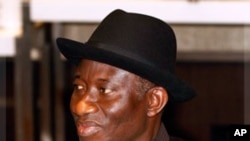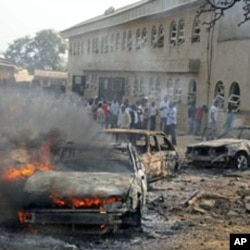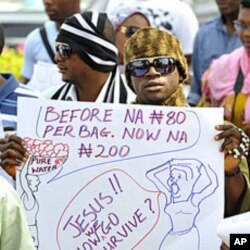In his televised address to the Nigerian people on Saturday, President Goodluck Jonathan appealed for their assistance and cooperation in dealing the country's burgeoning crises. Facing continued Islamist attacks, Christians in the north have started to flee in numbers that might have been greater were it not for the drastic increase in fuel prices last week.
In the face of two simultaneous and escalating crises, President Jonathan took to the airwaves Saturday in an effort to reassure the Nigerian public - many of whom are fearful or angry, or both. He first addressed the acts of terror against Christian communities - the most recent of which have claimed more than 37 lives since Thursday. The attacks took place in the Muslim majority north, much of which remains under a state-of-emergency issued on December 31.
"With that declaration the government has again signaled its intention to combat terrorism with renewed vigor and I assure every Nigerian of safety," he said.
Religious conflicts
But many Christians are not satisfied with the president's response nor with his renewed assurances. Hundreds have fled the north after the militant Islamist group Boko Haram issued a warning last week that said failure to do so in three days would result in more killings.
The deadline has expired and it appears the militant Islamist group has fulfilled its promise. The president of the Christian Association of Nigeria, Ayo Oritsejafor, said the ethnic and religious cleansing reminded him of Nigeria's civil war, which broke out in 1967 and left at least one million dead.
"If we look back, we will remember that this is exactly how it began. Killings like this in different places and then urging southerners to go and leave the north," said Oritsejafor. "And gradually, it exploded and ended up becoming a civil war. We are seeing the same thing happening right now."
He said Christians in the north have the right and responsibility to defend themselves. Whether out of fear of reprisal attacks or a call of return, some Muslims in the south have also started to head north.
Victor Dillide manages a solar power company in the southern state of Anambra. A Christian, he laments the loss of his Muslim employees, which he said were very nice people.
"I guess they are afraid of reprisals," said Dillide. "That is what I am suspecting. But I tried to talk to my employees and let them know that is far-fetched. But their people want them back home in northern Nigeria, so I guess they are acting on information. It is not like Christians here are pushing them to go."
Dillide said that they were free to go and he gave them a bonus for the trip home, which they might not have been able to afford otherwise. For many Christians in the impoverished north, however, retreat is not an affordable option.
Oil subsidy
In the intervening week since the government removed the country's oil subsidy, the price of gas has more than doubled, and nearly tripled in some places. In the same address, the president apologized to those making trips during the Christmas and New Year holiday season, citing increased costs for their return journey.
"I share the anger of all persons who have travelled out of their stations," he said. "If I were not here to lead the process of national renewal, if I were in your shoes at this moment, I probably would have reacted in the same manner as some of our compatriots, or hold the same critical views about government."
The move has sparked protests throughout the nation and a general strike to begin on Monday. That was an expected reaction to the years-old plan to remove the subsidy, which the government says encouraged corruption and discouraged investment.
Economists and analysts do not disagree. But the timing of the removal has stretched thin the government's ability to deal with both crises. President Jonathan has refused to reinstate the subsidy, and made a plea instead.
"I urge all Nigerians to eschew bitterness and acrimony to live together in harmony and peace," he said. "Wherever there is any threat to public peace, our security forces will enforce the law without fear or favor."
Without the cooperation of the people, the government may have difficulty avoiding an economic freeze and a civil war.






